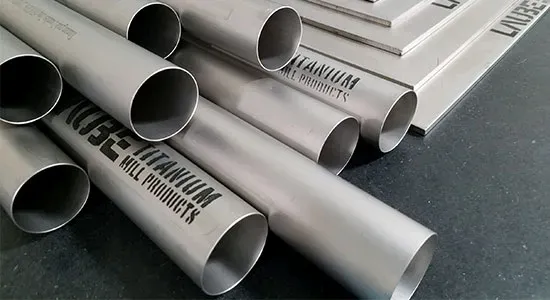Titanium Tubes in the Chemical Industry: Enhancing Safety and Efficiency
The chemical industry is a cornerstone of modern manufacturing, playing a crucial role in the production of various products, from pharmaceuticals to industrial chemicals. To maintain high standards of safety, efficiency, and durability in this demanding field, the choice of materials is paramount. Among the various materials available, titanium tubes have emerged as a game-changer, offering exceptional benefits that enhance both safety and efficiency in chemical processing. This blog explores the advantages of titanium tubes and their transformative impact on the chemical industry.
Role of Titanium Tubes in Chemical Processing
Exceptional Corrosion Resistance
One of the primary challenges in chemical processing is dealing with corrosive substances. Chemicals can rapidly deteriorate conventional materials, leading to equipment failure and safety hazards. Titanium tubes, however, are renowned for their exceptional corrosion resistance. Unlike stainless steel or other metals, titanium naturally forms a protective oxide layer when exposed to oxygen. This layer shields the titanium from corrosive agents, ensuring that the tubes remain intact and functional even in harsh chemical environments. By utilizing titanium tubes, chemical plants can significantly reduce maintenance costs and extend the lifespan of their equipment.
High Strength-to-Weight Ratio
Titanium is known for its remarkable strength-to-weight ratio. It is much stronger than steel while being significantly lighter. This characteristic is particularly beneficial in the chemical industry, where reducing the weight of equipment can lead to more efficient operations. Titanium tubes can withstand high pressure and mechanical stress without adding unnecessary weight to the system. This not only helps in improving the overall efficiency of the chemical processing systems but also contributes to easier handling and installation.
Enhancing Safety in Chemical Plants
Reduced Risk of Leaks and Failures
In the chemical industry, the integrity of equipment is crucial to preventing leaks and failures. Traditional materials, when exposed to aggressive chemicals, can develop leaks or cracks over time, posing serious risks to safety and the environment. Titanium tubes, with their superior corrosion resistance and durability, greatly minimize these risks. The robust nature of titanium ensures that the tubes maintain their structural integrity even under extreme conditions, reducing the likelihood of accidents and spills. This enhanced safety feature is vital for protecting both personnel and the environment.
Improved Reliability and Longevity
The longevity of equipment directly impacts the overall safety and efficiency of chemical processing operations, titanium tubes offer an extended lifespan compared to other materials due to their resistance to corrosion and wear. This longevity translates to fewer replacements and repairs, which not only lowers maintenance costs but also enhances the reliability of the chemical processing systems. A more reliable system means fewer disruptions and reduced risk of operational failures, contributing to a safer working environment.
Increasing Efficiency in Chemical Processing
Lower Maintenance and Downtime
Maintenance and downtime are significant concerns in any industrial operation. Traditional materials, especially those prone to corrosion, require frequent inspections and replacements, leading to costly downtime. Titanium tubes, with their durability and low maintenance requirements, help mitigate these issues. Their resistance to corrosion and wear reduces the frequency of inspections and replacements, resulting in decreased downtime and improved overall efficiency. Chemical plants can thus maintain continuous operations, leading to better productivity and cost savings.
Enhanced Performance in Extreme Conditions
Chemical processes often involve extreme temperatures and pressures. Titanium tubes excel in these challenging conditions, maintaining their performance where other materials might fail. They can operate effectively at high temperatures and pressures, ensuring that chemical reactions proceed smoothly without equipment failure. This ability to perform under extreme conditions enhances the efficiency of chemical processing systems and supports the production of high-quality products.
Applications of Titanium Tubes in the Chemical Industry
Heat Exchangers
Titanium tubes are widely used in heat exchangers within the chemical industry. Their resistance to corrosion and high thermal conductivity make them ideal for transferring heat efficiently without deteriorating over time. In applications where heat exchange is critical, titanium tubes ensure optimal performance and longevity.
Reactors and Storage Tanks
In reactors and storage tanks, where the containment of corrosive chemicals is essential, titanium tubes provide a reliable solution. Their ability to withstand aggressive chemicals and high pressures makes them suitable for use in various chemical processing applications, ensuring safe and efficient operations.
Pipelines and Transfer Lines
Titanium tubes are also used in pipelines and transfer lines for transporting chemicals. Their strength, durability, and resistance to corrosion make them ideal for maintaining the integrity of these systems, preventing leaks and ensuring smooth transport of chemicals.
Titanium tubes have proven to be a transformative material in the chemical industry, offering unparalleled benefits in terms of safety and efficiency. Their exceptional corrosion resistance, high strength-to-weight ratio, and reliability under extreme conditions make them an ideal choice for various applications in chemical processing. By incorporating titanium tubes into their systems, chemical plants can enhance safety, reduce maintenance costs, and improve overall operational efficiency. As the industry continues to evolve, titanium tubes will undoubtedly play a crucial role in shaping the future of chemical processing
